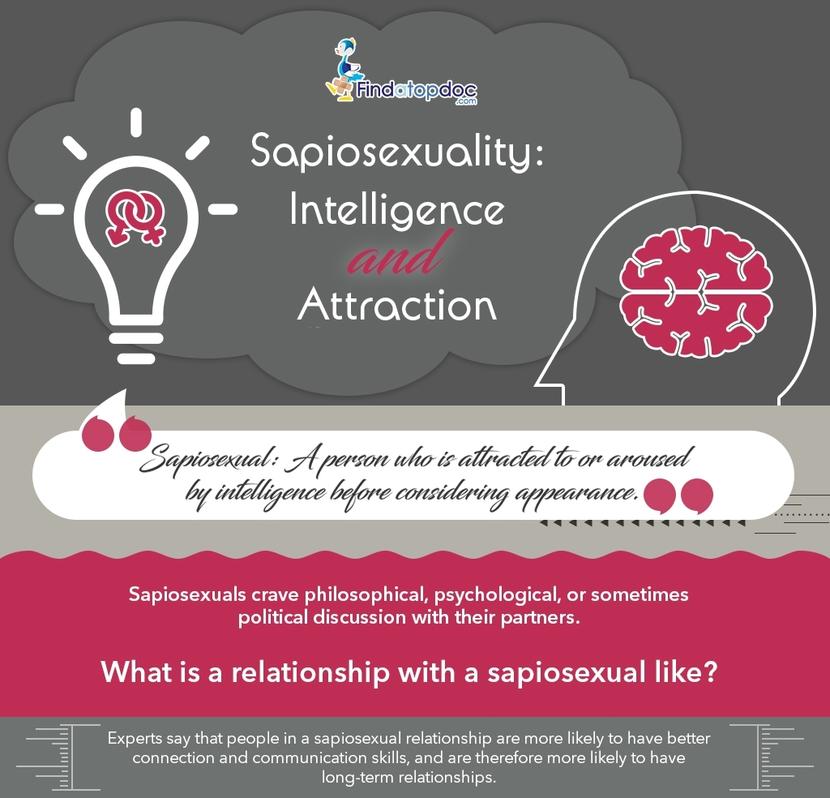Sapiosexual: The Definition
Sapiosexual is derived from the Latin word sapiens, which means intelligent or wise, and sexualis, which relates to the sexes. A sapiosexual, or less popularly called as sapiophile, is an individual who is attracted to or aroused by the intelligence of other people. Individuals who are sapiosexuals prefer intelligence more than any other quality in a potential partner. Although intelligence is a factor we commonly look for when searching for our right match, sapiosexuals make intelligence the top requirement. It is safe to say that they fall in love with the person’s mind. According to psychologists, the brain is the largest sex organ. For sapiosexuals, intelligence is the salient and most sexually attractive of all qualities in a person.
Chemistry plays a big role in attraction and relationships. However, personality traits also undoubtedly play a large part in attraction, apart from other factors such as physical appearance, wealth, and status (depending on what one is attracted to). Personality characteristics are among the factors that determine whether one person will be drawn to another. Most people are usually drawn towards qualities such as friendliness, charisma, thoughtfulness, intelligence, and kindness. With sapiosexuals, it is intelligence that is the greatest draw and the sexiest aspect of a potential partner or mate.

Experts say that people who are in a sapiosexual relationship have a higher probability of making it long-term because the intimacy between them goes beyond physical aspects. Connection and communication are of the greatest importance to them.
What does it mean to be a sapiosexual?
An individual who admits to being a sapiosexual will say that he or she is turned on by the brain, and gets excited or titillated by the insights of other people. It also means that the individual you are attracted to tends to be inquisitive, incisive, intellectual, and even irreverent. Sapiosexuals often crave philosophical, psychological, or political discussions as these topics turn them on.
There are also cases of purely platonic friendships that are fired up by the individuals’ sapiosexual desires and there is great intellectual synergy. Such relationships can often be observed in the workplace and may be considered another aspect of sapiosexuality—that is, the need to interact and be connected with intelligent people, and the result need not be emotional or sexual intimacy.
Intelligent Conversation Topics
Two sapiosexuals may find any intelligent interest a connecting factor. Two scientists may be sapiosexuals, and their passion and interest in science may allow them to discuss the topic in a way that brings about a very attractive conversation for them both.
Sapiosexuals naturally value intelligent conversations, and therefore common interests in intelligent topics will likely bring sapiosexuals together. Some conversation topics may include:
- Classic literature
- Politics
- Sciences (physics, chemistry, biology, earth science, computer science, or environmental science)
- Health and the medical field
- Philosophy
- History
- Mathematics
- Language
Examples of Sapiosexuals
There are a number of celebrities who have shown signs of being sapiosexual. Some famous people have a known history of dating top models, but have not settled down with any of them. Maybe good looks just weren’t enough for a lifetime commitment. Some of these famous people who are known for dating beautiful people in the past have ultimately married a person with high intelligence. George Clooney is an excellent example of one of these celebrities. His history is filled with models, but he ultimately chose to marry Amal Clooney, previously Amal Alamuddin, who is a human rights lawyer and activist.
Some well-known fictional characters have also shown signs of being sapiosexual. Let’s take Belle from Beauty and the Beast. The very handsome heartthrob of her village, Gaston, wanted to marry her, but she was not interested in him. Instead, Belle fell in love with the beast. As unattractive as the beast was physically, Belle loved his knowledge of books and his impressive library. The two could discuss literature together, and this intellectual attraction caused Belle to fall in love. Belle and the beast discussed novels. This intellectual connection won over their hearts. For others, topics of conversation could be biology or politics.
Can you think of any other real-life celebrities or fictional characters that might be sapiosexual?
How will you know if you’re a sapiosexual?
You’re a sapiophile if you are challenged or aroused by how another person thinks, and you are in love with the other person’s mind. Another newly minted word related to sapiosexuals is nymphobrainiac. People who are nymphobrainiac are aroused by engaging with the intellect of another person. However, this neologism sounds pathological or extreme to some people.
A common feature among sapiosexuals is that they can identify intelligence in other people almost instantly. For instance, a sapiosexual who is reading a book about French literature is greatly turned on when someone approaches him or her and comments on the book. A sapiosexual is attracted to a person who is knowledgeable about the things that interest the sapiosexual.
To know if you are a sapiosexual, ask yourself the questions listed below:
- Do you get sexually attracted to other people only when you detect that they have wit, intelligence, and taste?
- Does a person’s looks hold very little weight with respect to whether or not you find them sexually attractive?
- Have you ever lost sexual interest in someone upon realizing that he or she was not intelligent enough for you?
- Does a person who is very smart seem to be a lot better to you than someone who is not?
- Would you decline a person making advances if you found out that he or she didn’t read much or worse, didn’t read at all?
- Do you get sexually aroused by a person’s display of great knowledge and intelligence?
- Would you reject someone who isn’t able to keep up with you in intellectual discussions?
- Are you disgusted by the idea of having sex with someone who didn’t go to college or who has no interest in higher education?
- Do you think that you can’t enjoy sex with someone if you don’t or can’t intellectually connect with them?
If you answer “yes” to all or most of the questions, then you could call yourself a sapiosexual.
Other Sapiosexual Indicators
1. You find other people more attractive as you get to know them.
A sapiosexual does not care much if a person is not physically attractive. A sapiosexual finds the other person increasingly attractive the more they talk and get to know each other. The reason is that being a sapiosexual means that the main attraction of a person is his or her intelligence. The more a sapiosexual discovers the mind of another person, the more fascinating it becomes.
2. Instead of casual sex, you’d rather have a great conversation.
Sapiosexuals are turned on and fulfilled by mental activities more than physical ones. However, it does not necessarily mean that they would not have casual sex. It’s just that they prefer more challenging and thought-provoking conversations.
3. You are definitely turned on by what a person knows rather than what he or she has.
Wealth and social status are of less importance to you. What intrigues you is the person’s knowledge and intellect, and what energizes them to achieve personal greatness.
4. You just cannot put up with bad grammar.
In choosing partners, a sapiosexual tends to choose one whose level of intelligence is similar to or higher than theirs. A person with bad grammar is a big turnoff for sapiosexuals.
5. You are turned on by any form of knowledge.
The person need not have a genius-level IQ or be at the top of his or her class. What matters to you are the interest and profound love the person has for whatever form of knowledge.
Other sexual Orientations and Sexual Behavior
There are also other sexual orientations and types of sexual behavior, which include those classified as sexual deviations and disorders by the DSM-5. Sexual orientation describes the pattern of an individual’s sexual attraction based on gender. It is different from affectional or romantic orientation, which indicates the sex or gender a person is most likely to have a romantic relationship or fall in love with.
The three basic types of sexual orientation are monosexual, asexual, and polysexual.
- Monosexual – The monosexual type of sexual orientation is exclusively attracted to one gender. Examples of monosexuals are people who are straight, lesbian, or gay.
- Asexual – Individuals whose orientation is asexual are those who do not experience any sexual desires or attraction to other people at all.
- Polysexual – It is a person whose sexual orientation is attracted to multiple genders. Other terms for polysexual are bisexual, pansexual, and queer.
Through the years, a number of neologisms describing non-heterosexual and sexual orientations have been coined, as the landscape of gender identity and sexual orientations have also changed. Below are some of the terms used to denote various sexual orientations and behaviors that have been identified. Note that some of them are considered deviations, abnormal behaviors, or disorders in the DSM-5. Some are even illegal in most places.
Heterosexual
This is also known as being “straight”, as this is the conventional sexual orientation, in which a person is attracted only to the opposite sex.
Homosexual
Homosexuality is the sexual attraction or desire between individuals of the same sex.
Read Haunting Photo Series Explores Homosexuality In India
Pedophilia
Pedophilia is described as a sexual attraction toward children at the pre-puberty stage, that is, 13 years of age or below. A pedophile must be at least 16 years old, and at least five years older than the child. Some pedophiles have gender preferences while some are aroused by both boys and girls.
Exhibitionism
This is characterized by recurrent and strong fantasies, behaviors, or sexual urges involving the exposure of one’s genitals to an unwary stranger.
Voyeurism
People with voyeurism derive sexual pleasure from watching others engaged in intimate, private actions such as undressing and sexual activities. A voyeur who does this secretively is commonly called a peeping Tom.
Bestiality
Also known as zoophilia, bestiality is engaging in sexual activities with animals. Bestiality is explicitly illegal in most US states and many countries around the world.
Bisexual
This sexual orientation is characterized by having sexual desires and relationships with both males and females.
Read 10 Reasons Giving Up On Men and Becoming a Lesbian Isn’t Such a Bad Idea
Coprophilia
People with coprophilia have sexual desires associated with defecation and feces.
Frotteurism
This is characterized by recurrent and powerful sexual fantasies, behaviors, or sexual urges that involve touching or rubbing one’s genitals against another person without his or her consent.
Demisexual
People who are demisexuals are not sexually attracted to others until they feel a deep bond with or romantic feelings for the other person. These people need to be friends first before they become sexually involved.
Pansexual
People who are pansexuals are attracted to individuals of any gender identity or sexual orientation.
Autosexual
An autosexual is a person who prefers self-gratification or autoeroticism rather than having sex with other people.
Gynephilia
This is an attraction towards femininity, and is seen in both men and women.
Omnisexual
This refers to a person who feels the same amount of sexual attraction towards anyone regardless of their sex or gender identity.
Spectrasexual
sexual attraction is geared toward various genders or sexes.
Fetishism
This type of sexual orientation involves fantasies or sexual urges involving the use of particular objects such as female undergarments.
Klismaphilia
This is characterized by sexual arousal or pleasure derived from enemas.
Necrophilia
This is an abnormal obsession with death and the dead, particularly having an erotic attraction or desire for corpses.
Partialism
People with partialism are focused on and aroused by only a particular part of a body.
sexual Masochism
This type of sexual orientation involves being beaten, humiliated, bound, or made to suffer, as these acts arouse the person’s sexual fantasies and urges.
sexual Sadism
This involves recurrent, intense, and sexually arousing fantasies or sexual urges, in which the physical or psychological suffering of a person is sexually exciting to the other person.
Telephone Scatologia
This is the repetitive sexual obsession of making obscene telephone calls to other people.
Transgenderism
This type of sexual orientation is where the gender identity of a person is unclear. The person takes on the sexual identity of either a male or female to carry out his or her sexual behavior and fantasies.
Transsexual
A transsexual is a person who identifies him- or herself as having the identity of the opposite sex. Sometimes, the person undergoes surgery or hormone injections to achieve the change of sex that he or she wants.
Urophilia
This is a fetish for urine or urinating, or a dependency on either for sexual pleasure.
Polyamory
People who practice polyamory have non-exclusive intimate relationships with the people they are attracted to.
Pomosexual
A pomosexual does not identify with a particular label or orientation, does not find any of them useful, and thus, disregards them.
Skoliosexual
A skoliosexual is a person who is sexually attracted to people with gender-variant behavior.
Menosexual
A menosexual is sexually aroused by those who are menstruating.
Lithromantic
This refers to a person who is romantically attracted to a person, but does not want or need his or her feelings reciprocated.
Androgynoromantic
An androgynoromantic person feels a romantic attraction toward androgynous people (individuals whose expression is both masculine and feminine).









Leave a Reply
You must be logged in to post a comment.